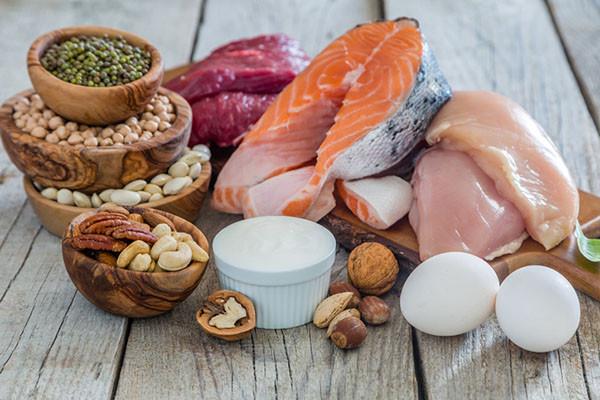In the ever-evolving landscape of dietary trends, high-protein diets have emerged as a popular beacon for those navigating the turbulent seas of weight loss. Promising a satiating path to shedding pounds, these diets have gained favor among fitness enthusiasts and casual dieters alike. Yet, as with any enduring voyage, questions arise about the long-term safety and efficacy of this protein-rich regimen. Can these diets sustain a healthy weight loss journey, or do they harbor hidden pitfalls beneath their appealing surface? This article delves into the intricacies of high-protein diets, examining the balance between promise and peril, and exploring whether they truly offer a sustainable solution for long-term weight management.
Understanding High-Protein Diets and Their Role in Weight Management
High-protein diets have gained popularity for their potential benefits in weight management, offering a promising avenue for those seeking sustainable solutions. By emphasizing protein-rich foods, these diets can enhance satiety, reduce hunger, and help maintain muscle mass during weight loss. The role of protein in metabolism is also crucial, as it requires more energy to digest compared to fats and carbohydrates, potentially increasing calorie burn. However, while these benefits are compelling, it’s essential to consider the long-term implications of adhering to such dietary patterns.
When evaluating the safety of high-protein diets for extended periods, several factors should be considered:
- Kidney Health: Concerns about kidney strain are often cited, though evidence suggests that high-protein intake is generally safe for individuals with healthy kidneys.
- Nutritional Balance: Overemphasis on protein can sometimes lead to insufficient intake of other essential nutrients found in fruits, vegetables, and whole grains.
- Heart Health: Choosing lean protein sources over those high in saturated fats is crucial to avoid potential cardiovascular risks.
Ultimately, while high-protein diets can be effective for weight management, ensuring a balanced and varied diet remains key to long-term health.

The Science Behind Protein Consumption and Metabolism
Understanding the intricate processes involved in how our bodies handle protein is crucial to evaluating the safety and efficacy of high-protein diets for sustained weight loss. At the core of this mechanism is the body’s ability to metabolize protein into amino acids, which are the building blocks of muscle, enzymes, and hormones. Once ingested, proteins are broken down in the stomach and small intestine through the action of enzymes such as pepsin and trypsin. These amino acids are then absorbed into the bloodstream, where they are utilized for various bodily functions.
Benefits of Protein Consumption:
- Increased Satiety: High-protein diets can enhance feelings of fullness, reducing overall calorie intake.
- Muscle Maintenance: Protein is essential for preserving muscle mass, particularly during weight loss.
- Thermogenic Effect: The digestion of protein requires more energy, slightly boosting metabolism.
While the benefits are notable, it’s important to balance protein intake with other nutrients to ensure overall health and prevent potential issues like kidney strain. As research continues, understanding the science of protein metabolism helps in making informed dietary choices.

Evaluating the Long-Term Health Implications of High-Protein Diets
While high-protein diets have surged in popularity for their effectiveness in promoting weight loss and muscle gain, their long-term health implications remain a topic of ongoing research and debate. Potential benefits of sustained high-protein consumption include improved satiety, which may help with portion control and reduce overall calorie intake. Additionally, protein is crucial for maintaining muscle mass, particularly as we age, which can support metabolic health.
However, concerns about the long-term effects of such diets cannot be overlooked. Some studies suggest that excessive protein intake, especially from animal sources, might strain the kidneys over time or contribute to cardiovascular issues due to increased saturated fat intake. Moreover, relying heavily on protein could lead to nutrient deficiencies if other essential food groups are neglected. It’s essential to consider these factors:
- Balance: Ensure a well-rounded diet that includes vegetables, fruits, and whole grains.
- Source: Opt for lean protein sources like fish, poultry, legumes, and nuts.
- Moderation: Avoid extreme dietary restrictions that may be unsustainable.
Ultimately, while high-protein diets can be effective, they should be approached with careful consideration and tailored to individual health needs and goals.

Expert Recommendations for Safely Incorporating High-Protein Diets
When considering a high-protein diet for long-term weight loss, experts suggest a balanced approach to ensure safety and effectiveness. It’s essential to choose a variety of protein sources to avoid nutritional imbalances. Incorporate both animal and plant-based proteins such as chicken, fish, beans, lentils, and tofu to maintain a diverse nutrient profile. This approach not only provides essential amino acids but also ensures adequate intake of fiber, vitamins, and minerals.
- Stay Hydrated: High protein intake can increase the body’s need for water, so drink plenty of fluids throughout the day.
- Monitor Kidney Health: Those with pre-existing kidney conditions should consult with a healthcare provider before starting a high-protein diet.
- Balance Macronutrients: Ensure that fats and carbohydrates are not excessively restricted, as they play crucial roles in overall health and energy levels.
- Listen to Your Body: Pay attention to how your body responds to increased protein and adjust accordingly to avoid potential issues such as fatigue or digestive discomfort.
In Summary
In the ever-evolving landscape of nutrition, the question of whether high-protein diets are a safe ally for long-term weight loss continues to intrigue and divide experts and enthusiasts alike. As we’ve journeyed through the intricate web of scientific studies, personal anecdotes, and nutritional guidelines, it’s clear that the answer is not a simple one-size-fits-all. High-protein diets can indeed offer promising results for some, providing a sense of satiety and aiding in muscle maintenance. However, like any dietary approach, they come with their own set of considerations and potential pitfalls. Ultimately, the key lies in balance, personalization, and ongoing dialogue with healthcare professionals. As we close this chapter on high-protein diets, let us remain curious, informed, and open-minded, ready to adapt and evolve our dietary choices in pursuit of health and well-being. The journey to understanding nutrition is ongoing, and the conversation is far from over.

